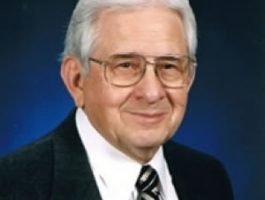
The Sinking of the USS Indianapolis
Imagine yourself floating in the ocean, with your friends dying all around you. For one veteran, Ed Harrell, this scene was terrifyingly real, as he and his shipmates waited to be rescued after their ship, the USS Indianapolis, was torpedoed by a Japanese submarine in WWII. Hear more about this historic event from a man who courageously survived it by tuning into today's broadcast.
Show Notes
About the Host
About the Guest
-
Imagine yourself floating in the ocean, with your friends dying all around you. For one veteran, Ed Harrell, this scene was terrifyingly real, as he and his shipmates waited to be rescued after their ship, the USS Indianapolis, was torpedoed by a Japanese submarine in WWII. Hear more about this historic event from a man who courageously survived it by tuning into today's broadcast.
-
Dave and Ann Wilson
Dave and Ann Wilson are hosts of FamilyLife Today®, FamilyLife’s nationally-syndicated radio program. Dave and Ann have been married for more than 38 years and have spent the last 33 teaching and mentoring couples and parents across the country. They have been featured speakers at FamilyLife’s Weekend to Remember® marriage getaway since 1993 and have also hosted their own marriage conferences across the country. Cofounders of Kensington Church—a national, multicampus church that hosts more than 14,000 visitors every weekend—the Wilsons are the creative force behind DVD teaching series Rock Your Marriage and The Survival Guide To Parenting, as well as authors of the recently released book Vertical Marriage (Zondervan, 2019). Dave is a graduate of the International School of Theology, where he received a Master of Divinity degree. A Ball State University Hall of Fame quarterback, Dave served the Detroit Lions as chaplain for 33 years. Ann attended the University of Kentucky. She has been active alongside Dave in ministry as a speaker, writer, small-group leader, and mentor to countless wives of professional athletes. The Wilsons live in the Detroit area. They have three grown sons, CJ, Austin, and Cody, three daughters-in-law, and a growing number of grandchildren.
-

Ed Harrell
Edgar Harrell owned and operated the Pella Window Company, Inc., Rock Island, Illinois for thirty-five years until his retirement in 1985. During the years 1970 to 1985, he served on the board of trustees of the Moody Bible Institute, in Chicago, Illinois, and has been a popular Bible teacher and lay minister throughout his adult life. He has enjoyed many years of fishing and big game hunting in the Rocky Mountains from Alaska to New Mexico, and currently resides in Clarksville, Tennessee with h...more
Imagine yourself floating in the ocean, with your friends dying all around you.
Bob: Sixty-five years ago this month on July 30, 1945, a Japanese submarine launched torpedoes that would sink the USS Indianapolis. Marine Ed Harrell was on board the Indianapolis that night.
Ed: When I actually left the ship, and there I prayed that somehow the Lord would see me through what lie ahead, and yet I had the foggiest idea that I'm going to be out there for four-and-a-half days. There's times when you pray and there's times when you pray—and there is a difference.
Bob: This is FamilyLife Today for Tuesday, July 6th. Our host is the President of FamilyLife Dennis Rainey, and I'm Bob Lepine. Of the nearly 1,200 men who were onboard the Indianapolis on that night only 317 survived the attack. Ed Harrell was one of those survivors. We'll hear his story today.
Welcome to FamilyLife Today; thanks for joining us.
Dennis: Bob, I want you to imagine with me a pretty dramatic scene. Just consider yourself being 20 years old. You are a Marine—you’re tough, you're physically fit, but you're alone—you’re in the ocean—you’ve just lost your ship. You and about 80 others are floating in the middle of the night in the ocean in lifejackets. We're going to hear a story—one of the most compelling stories I think I've ever heard from a gentleman who joins us on FamilyLife Today—one of the survivors of the USS Indianapolis.
Bob: A man who doesn't have to imagine what you just described because he lived through it.
Dennis: That's exactly right. Ed Harrell joins us on FamilyLife Today. Welcome to the broadcast, Ed.
Ed: Thank you so much. It's a delight to be with you.
Dennis: Ed was a businessman for 38 years. He's served as a member of the board of trustees at Moody Bible Institute, a great ministry. He and his wife, Ola, who have been married since 1947 – that's a lot of years, that's a lot of years, live in Paris, Tennessee. They have two children, eight grandchildren, and four great-grandchildren.
Ed: That's right.
Dennis: You've lived quite a life, Ed, but you're one of the few survivors of that tragedy. Take us back, first of all, to when you signed up. Why in the world did you sign up to be a Marine? It was 1943, is that right?
Ed: That's right, 1943. I don't know that I can even know why I really did at the time, but I knew that the war was getting pretty close to home, it sounded to me. In fact, when I heard that the Japanese and the American forces were having quite a battle at Midway, I was thinking that Midway was maybe between San Francisco and Hawaii.
(laughter)
I thought, “You know, they're getting pretty close to America.” I had just finished my junior year in high school, and I volunteered then for the Marine Corps.
Bob: You were 17, 18 years old?
Ed: I was 18. I actually became a Marine when I was 18.
Bob: You know, Ed, my son is a junior in high school, and the thought of my son saying, "I'm going to sign up to be a Marine,” in the middle of this kind of conflict—as a parent, I'm not sure I'd endorse that plan. Were your parents behind it?
Ed: Yes, I think they pretty much agreed. Dad pretty much agreed. They didn't necessarily want to see me leave; but they knew, too, the little Silvertone radio that we had was telling us quite a bit what was happening in the Pacific. I didn't have much problem convincing them that I wanted to go. In fact, I have two grandsons in the Marine Corps today.
Dennis: Do you remember that time when you said, “Goodbye,” to your dad?
Ed: I do. My dad was 37 or 39 years old, and I thought he was an old man then.
(laughter)
I told him, “Goodbye,” at the bus station.
Dennis: Did you hug?
Ed: Yes, yes, we did.
Dennis: Were there tears?
Ed: There were some tears; there were some tears.
Dennis: What did he say to you?
Ed: I don't know that I can remember what he said, but I'm sure that the advice that he gave me—he was a fine Christian man—and I'm sure it was some good, solid advice that he was giving me.
Bob: Why the Marines? Why did you pick them instead of the Army, the Navy, or the Air Force?
Ed: I wondered sometimes, “Why?”—if I picked the wrong one—but I really don't know. I even considered, after I got in the Marine Corps, that I would be a paratrooper. After I got through boot camp, they said, “You’re going to sea school." I didn't know what that meant either, but I went through sea school. Then they said, "You're going aboard a large combatant ship," and so I waited then until the Indianapolis was in port and caught it at San Francisco.
Dennis: Before you left to join the Marines, you made another decision that was a life-altering decision.
Ed: Yes, I did. On the 1st of August, 1943, already a Marine and yet hadn't shown up even for my boot camp, I went to church on that Lord's Day morning, and seeming the Lord was saying to me, "Your last chance, your last chance." The preacher preached a message, and he gave an invitation. He pronounced the benediction, and I sat there. I knew that my heart was not right with the Lord—knowing that I was going into combat soon, I had to get things right with the Lord.
I know the pastor came back and sat down by me there. Everyone else had left the building except two people—one was my wife later-to-be, and my mother-in-law later-to-be, and they were back in the back of the building praying. The pastor turned to a Scripture, Acts 16:31, which simply says, "Believe in the Lord Jesus Christ and thou shall be saved." He said, "Ed, do you believe that?"
Well, I was brought up in a Christian home and Sunday school, church all the time, but really never trusted the Lord as my own personal Savior. So he goes over that a time or two, and he said, "Ed, God, who cannot lie, is making you a promise. He simply says, Believe on the Lord Jesus Christ,”—the finished work of Christ on the cross for you; and He promises to save you.
And then he would look at me and said, "Do you believe that?" I said, "Yes, I believe that.” He said, "But does the Lord save you?" "No." Well, he went over it a time or two; and there, in the quietness of that little pew there in the church, I trusted the Lord Jesus Christ as my personal Savior.
So later now, when I'm getting into the story of the actual sinking of the ship, I could really look back and rely on the faith and trust that I had in the Lord to care for me, even there in the water those days.
Dennis: You did end up joining the Marines then. You boarded the USS Indianapolis in San Francisco.
Ed: In San Francisco.
Dennis: At that point, you had not been to war—you had not been in any battles. That was soon to change, wasn’t it?
Ed: That’s right. Of course, to get aboard a large combatant ship like that—that ship was
610 feet, 8 3/4 inches, and four- or five-stories high, and that's going to be my home, you know, for a time. And then after I got aboard, then to see all those big guns that I'm going to have to learn how to fire those things. I think I say in my book the biggest gun that I'd ever fired was a double-barreled shotgun, and yet here I'm going to be firing five-inch guns and 40- millimeter guns—so I'll be trained to do those things.
Then I was at Saipan—actually, I was at Enewetak and Kwajalein Islands there in the Marshalls. Then the first, really, combat was at Saipan, then at Tinian, and at Guam. The sea battle of the Philippine Seas—that was at Palau, at Iwo Jima, at Okinawa, and later three air strikes on Tokyo. Lastly, I was Marine guard that guarded the two atomic bomb—components of the bombs that we took over to our B-29 base on the island of Tinian.
Bob: And you didn't know, when you got on board the Indianapolis in San Francisco Harbor, you didn't know what else was on board with you. You didn't know that you had...
Ed: We did not know.
Bob: … the two atomic bombs that were going to be dropped on Hiroshima and Nagasaki.
Ed: We knew it was top-secret cargo. We understood, even, that the captain of the ship didn't know what we had. He had been told that what he had—we needed to get it to the forward area—that every hour would save lives. I was a guard that guarded—or, actually, I was a corporal of the guard; and I stationed guards both on the two places that we had the components of the bomb.
Bob: San Francisco to Tinian—how long a trip is that in the water?
Ed: We made a record speed-run. We traveled those 5,400 or so miles in ten days.
Bob: Wow.
Ed: So, can you imagine a heavy cruiser traveling, like, 32 miles an hour across the Pacific? So we made a record speed-run to Tinian Island and got rid of our cargo.
Dennis: And you got rid of the cargo, made the turn, and you were to participate with another ship.
Ed: We received orders at CENPAC there in Guam, the Central Pacific Command, to proceed to the Philippines, but we were to—yes, we were to join up with the USS Idaho, I think, three days later, to make a gunnery practice as we went into the Philippines because the main invasion of Japan was to take place in November of '45.
Dennis: We're not going to go into the detail that surrounds a great controversy about the USS Indianapolis because some information was withheld about the enemy being in the waters—enemy subs—and you guys sailed into harm's way without realizing it. But you were in the process of making your way to join up with the USS Idaho, and it was really an uneventful trip. You weren't even going all that fast at that point, right?
Ed: As I mentioned, we had traveled 32 knots going into Tinian; and then when we received orders then to go on to the Philippines, Captain McVay requested, or they gave him permission to travel only at 17 knots to slow down, because we had nearly burned the motors up, you know, getting the cargo over. So we had slowed back to 17 knots going on to the Philippines.
Dennis: You were one day away from connecting with the USS Idaho, and was it the middle of the night?
Ed: Well, we were to have met them the next day in the daytime, but we encountered Commander Hoshimoto at about five minutes after midnight on the night of July 30, 1945.
Bob: Now, where were you when that happened? Were you asleep in your bunk?
Ed: No, the Indianapolis was a pretty modern ship, but we did not have air-conditioning. In order to get any sleep at night, you went topside. So I was on watch 'til 12:00. At 12:00 I went to my locker and I got my blanket, and I went topside.
I went up under the barrels of No. 1 turret, and I took off my shoes and used kind of the arch of my shoe as a pillow. I rolled up in my blanket, and I began to try to doze off to sleep there. It was about five minutes or so after midnight that the first explosion—we took the first torpedo. About as long as it would take Commander Hoshimoto to say, "Fire one, fire two," and he fired six, but two of them hit us.
The first one cut the bow of the ship off. If you could see the picture of the ship, you could see that those barrels on No. 1 turret, forward big 8-inch guns—they are about 18 feet long—and I'm sleeping right down on the deck under the barrels of those guns. Looking forward of me, maybe 25-, 30-feet or so, the bow of the ship is cut off—about 50 feet. Some said 65 feet, but I don't think it was that much. I think it was more of 40 feet or so. The bow of the ship was cut off, so we became a funnel, then, as we were moving through the water. Then the second explosion then was aft of me, nearly mid-ship and close to the marine compartment, and it made a big gaping hole.
And, of course, since we had no air conditioning, we were traveling at a—you might say—at an open-condition in that all of our bulkheads down below were open. They had to be open or else we would suffocate without air conditioning. So that was a death blow, likewise, because as we were moving forward in the water, all of that water…
Dennis: That water just poured in the front.
Ed: It was rushing in. Even before I could get back to my emergency station, which was back at mid-ship, the bow of the ship is already under. I mean, the deck of the bow of the ship, like the first 100 yards or so, is already under.
Dennis: Was there still light on the ship at this point, or had the torpedoes knocked out the electricity?
Ed: All the electricity was knocked out.
Dennis: So, you're in the middle of the night…
Ed: But we had light in that there was an inferno below decks. They say that No. 2 turret took a hit, and the magazine in No. 2 turret had exploded and came through all the way up so that it was just a big fire—a big blaze—coming up through there. And then most other places below decks, forward of mid-ship, were an inferno. And so you get a certain amount of light, you know, from that.
Dennis: You said when the torpedoes hit and the boat blew up—blew the front end off—that there was a huge amount of water that went up in the air, and it drenched you and ultimately kept you from burning up?
Ed: I think two things. Of course, I believe in the providence of God—No. 1. I had the blanket around me and that protected me—no doubt—maybe from much of the blast of the fire at the first explosion. All of the water, then, from that first explosion that went up in the air—I don't know—I could imagine 50- to 100-feet plus, then all of that coming back down. Well, I was drenched, you know, with all the water as it came back down. That kind of protected me somewhat, I'm sure, from much of the flash-burn that many were getting.
Bob: Ed, when something like that happens, it's disorienting at first. You're thinking, "Did something explode down in the engine room?" You're kind of trying to get your bearings. How long do you think it was before you realized, "We're under attack; we've been hit," and you caught a sense of what was going on?
Ed: I think immediately when we were hit, I wondered, "We aren't firing at anyone." Then just those three explosions and no one now is firing back at us. So we had to have either hit a mine or we had to have been hit by a torpedo.
Then realizing, nearly immediately, that the forward part of the ship was cut off, and I could hear the bulkheads breaking down below. They, to me, were a death blow. You could imagine, you know, with all that water—with the ship still moving 17 knots or so and the funnel and all of the water coming in, and the bulkheads breaking, you knew that the ship was doomed.
As I began to make my way then back to my emergency station, which was back to mid-ship, and there were those that were coming from internally—coming out. That part of the ship, really, was kind of the officers' quarters up there. As they began to come out—many of them as they began to come out—and of course, it is right after midnight and they came out in their night clothing, which nearly was nothing. As they came out, many of those were in the flash burns; and as they came out, literally, flesh was hanging from their face and from their arms. They were in panic and begging for someone to give them some help.
But, you know, that's not my responsibility; and I have to make my way to my emergency station, which was on the quarterdeck. And, of course, when I get to the quarterdeck, then, I'm realizing that the ship is already under forward part, and there's no question that it's sinking. The bow is already under and that fantail begins to come high in the air. It stands up on the forward part—and begins to turn to the starboard end and kind of noses down. Those screws are still turning.
Dennis: You still had to hang on because of the listing and the angling.
Ed: Yes. You couldn’t stand on the deck. You had to hold on to something or lean against the bulkhead. So as word actually came to abandon ship, I had made my way to the port side. There on the quarterdeck, there's a steel cable rail—as we call it. I got hold of the rail, and I hung on there and said my prayer.
Seeming the Lord brought to mind there as I was about to abandon ship. Seeing many of the boys actually jump on each other in a desperate rush to get off the ship, I hung on to that rail for a little while and I prayed. Oftentimes I say when I give talks is, “There’s times when you pray and there’s times when you pray—and there is a difference.
There I prayed that somehow the Lord would see me through what lie ahead. Yet, I didn’t have the foggiest idea that I was going to be out there for four-and-a-half days. To hear from the memory of His Word that he brought to mind, “Peace I give unto you, not as the world giveth, give I unto you. Let not your hearts be troubled. Do not be afraid.”
Yet, I am scared to death. As I left the ship, I left with the assurance I felt—in other words, God didn’t speak to me in any audible form in any way—but just the assurance I had from repeating His Word back to my heart, I knew that he was going to care for me.
I stepped over the rail and stepped about two big, long steps and jumped into the water feet first.
My kapok jacket then came up over my head.
Dennis: How far was the water below where you jumped off?
Ed: Probably not more than 5 or 6 feet—just a little ways because the ship was already sinking. If you could visualize that the deck of the ship now is listing so that you step over, and you walk down the keel of the ship—walk down the side of ship—and so I could have nearly walked to the water. But I walked down closer to the water, and then jumped in feet first.
Then began to come up and push that oil back that was on the water and then to try to get my head up above that, and then swam away from the ship about maybe 50 yards. Then we began to congregate, you know, in little groups. The ship had still been moving, so boys had been getting off maybe for two or three or four minutes. Some had maybe gotten off even early on. I actually watched the ship as she went under.
Dennis: You mentioned pushing the oil back. How thick was the oil on the surface of the ocean?
Ed: I’d have to say I didn’t measure. (laughter) Some said, from different ones I have read, they would say it was ½-inch thick. I don’t know if it was that thick; but you could imagine if all that ship had been ruptured and all of that crude oil is leaking out into the water, by now we are nearly stopped and we are standing on the bow and it is thick and covered—it was just a lot of oil—I know that.
Bob: Did you think this was it for you?
Ed: I wondered, and yet I really felt—and I don't say this in any boasting way of any kind, but I really had the assurance that somehow, some way, that I would make it. I felt assurance that, "Don't be afraid, don't be afraid. I'm with you." I think when you hear all of my story, you'll see the various times that He came to my assurance that, "I'm still with you," all the way through—the different things that happened for the next three days.
Bob: You spell that out so clearly in your book which is called Out of the Depths. I want to let our listeners know—if you would like to get a copy of Ed’s book, we are making it available this month for those of you who can help support the ministry of FamilyLife Today with a donation of any amount.
We are listener supported and your donations are what keep us on the air on this station and on our network of stations all across the country. Summer is one of those times of the year when we see a decline in donation revenue as folks are busy often with other priorities; but if you can help with a donation this month, I want you to feel free to request a copy of Ed Harrell’s book as a thank-you gift for your support of the ministry of FamilyLife Today.
Let me just say here, we don’t want you to do anything in making a donation that would take away from giving to your local church. We believe that support of the local church needs to be your first priority when it comes to giving. As you are able to help support other ministries or other endeavors, if you are able to support us this month, feel free to request a copy of the book Out of the Depths that tells Ed Harrell’s story. We are going to hear the story throughout the rest of this week.
Go on online at FamilyLifeToday.com to make your donation. Again, if you would like your copy of the book, just type the word “DEPTHS” in the key code box on the online donation form or call 1-800-FL-TODAY. Make a donation of any amount and just say, “I’d like a copy of the book Out of the Depths. Again, we will send it out to you.
Let me just say, “Thanks,” in advance for whatever you are able to do in support of the ministry of FamilyLife Today. We very much appreciate your partnership with us. We appreciate your prayers for this ministry as well.
Tomorrow we are going to begin to hear some of the dramatic events that took place in the middle of the Pacific following the attack on the Indianapolis. Ed Harrell is going to be back with us. I hope you can be back with us as well.
Thanks to our engineer today, Keith Lynch, and our entire broadcast production team. On behalf of our host Dennis Rainey, I'm Bob Lepine. We'll see you tomorrow for another edition of FamilyLife Today.
FamilyLife Today is a production of FamilyLife of Little Rock, Arkansas.
Help for today. Hope for tomorrow.
We are so happy to provide these transcripts for you. However, there is a cost to transcribe, create, and produce them for our website. If you've benefited from the broadcast transcripts, would you consider donating today to help defray the costs?
Copyright © FamilyLife. All rights reserved.
www.FamilyLife.com





